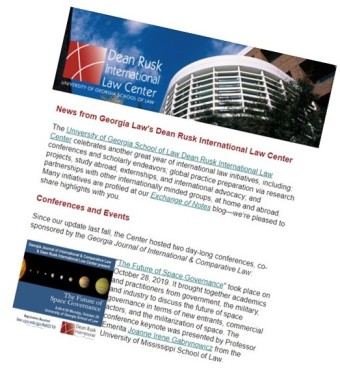This week’s global commemoration of the 30th anniversary of the Convention on the Rights of the Child includes a special contribution from a Faculty Co-Director of the Dean Rusk International Law Center here at the University of Georgia School of Law:
 The United Nations Audiovisual Library of International Law has just published “Child Rights, Conflict, and International Criminal Justice,” a lecture by Georgia Law Professor Diane Marie Amann, holder of the Emily & Ernest Woodruff Chair in International Law. As described in prior posts, Amann’s expertise in this field extends to her service as Special Adviser to International Criminal Court Prosecutor Fatou Bensouda on Children in & affected by Armed Conflict; that said, she produced this lecture in her personal capacity.
The United Nations Audiovisual Library of International Law has just published “Child Rights, Conflict, and International Criminal Justice,” a lecture by Georgia Law Professor Diane Marie Amann, holder of the Emily & Ernest Woodruff Chair in International Law. As described in prior posts, Amann’s expertise in this field extends to her service as Special Adviser to International Criminal Court Prosecutor Fatou Bensouda on Children in & affected by Armed Conflict; that said, she produced this lecture in her personal capacity.
Amann’s 41-minute lecture was taped 8 November 2019 at the Codification Division of the UN Office of Legal Affairs, UN Headquarters, New York. It is available in video (here) and audio formats (SoundCloud, Apple Podcasts, and Google Podcasts).
As Amann posted at her personal blog, the lecture begins by setting forth particular harms that children endure in armed conflict and similar violence. It proceeds to trace the developments in child rights that led to adoption, on 20 November 1989, of the Convention on the Rights of the Child. Next, it describes parallel developments in two other key legal fields, international humanitarian law and international criminal law. After looking at relevant provisions of the Child Rights Convention and other instruments – in particular, the 1998 Rome Statute of the International Criminal Court – the lecture concludes by evaluating efforts to ensure the rights of the child by preventing and punishing international crimes against and affecting children.
Also provided at Amann’s AVL Faculty Page is a list of related materials on which her lecture relies.
Amann said this about the treaty that is enjoying a celebration, in Wednesday’s “World Children’s Day” and throughout this week:
“As for the 1989 Child Rights Convention itself – today it has 196 parties, including the Holy See, the State of Palestine, and every UN member state except the United States of America. Because of its nearly universal acceptance, as well as its comprehensive contents, the Convention has served for the last thirty years as the pre-eminent global charter on child rights and protection.”
 Harlan G. Cohen, Gabriel M. Wilner/UGA Foundation Professor in International Law and Faculty Co-Director of the Dean Rusk International Law Center at the University of Georgia School of Law, was among more than 40 scholars from around the world who presented their scholarship earlier this month at at the International Economic Law and Security Interests Conference at the University of Amsterdam in the Netherlands.
Harlan G. Cohen, Gabriel M. Wilner/UGA Foundation Professor in International Law and Faculty Co-Director of the Dean Rusk International Law Center at the University of Georgia School of Law, was among more than 40 scholars from around the world who presented their scholarship earlier this month at at the International Economic Law and Security Interests Conference at the University of Amsterdam in the Netherlands.
 Professor
Professor 
